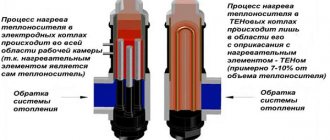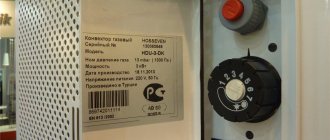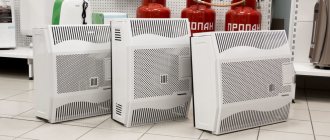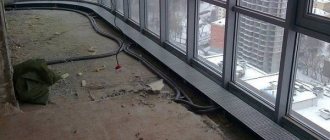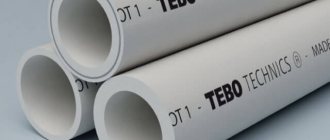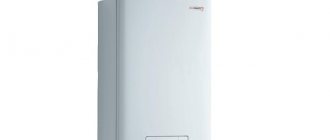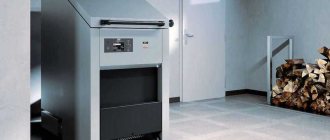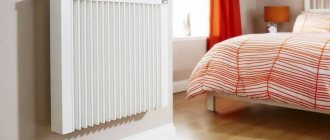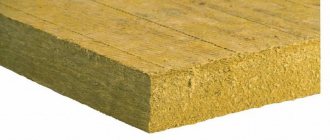Why an electric boiler can be cost-effective
Many people say that electric boilers should not be installed in any home. After all, installing a boiler will be more expensive and more effort will be required, however, this is not at all true. Electric boilers began to be used to heat houses in order to save money. But the fact is that if there are few heating appliances in the house, the economic efficiency of this method is invisible. But when there are a lot of devices, the savings become significant. However, it will not be visible to the naked eye; this saving must be explained.
Often people base their decision on only two facts: a boiler costs much more than several convectors, and the efficiency of these two options is approximately the same. It is about 98-99%. In this case, it turns out that it is much better to install cheaper convectors if their efficiency is the same as that of the boiler. In order to understand where the economic benefits from the boiler come from, it is necessary to resort to a mechanistic formula, which sounds like this: lowering the air temperature in the room by 1 degree leads to energy savings of 6%. In simple words, this formula says that if you overheat the air by only 3 degrees, then 18% of the energy carrier is lost, hence the economic efficiency of an electric boiler compared to electric convectors.
The fact is that the boiler can be set to a power that will cover the heat loss of the house for the air temperature that is now outside. Consequently, the air in the room will not overheat and the boiler will spend exactly as much energy as necessary to ensure heat loss in the house. But in convectors there is no way to set their power. The controls on them allow you to set only the desired temperature in a given room. This means that no matter the temperature you set, it will always operate at its full capacity. And the convector will turn off only when the air is already overheated. After all, he sees a difference in air temperature of only more than 2 degrees.
Thus, each time the air is heated, a certain amount of kilowatts will be lost, which were spent on overheating the air. Of course, the losses from one time are very small and even insignificant. However, this will happen every time the room is heated. And if you have a large house with more than 6 electric convectors installed, you will definitely feel these losses. However, this is not the only advantage of an electric boiler. Thanks to the presence of a buffer capacity, the boiler can be charged at night at a cheap rate. Ari will not waste electricity at all this day. But convectors do not have such an opportunity. When heating the air, they must be connected to the power supply.
And the third positive distinctive feature of the boiler is that it can be integrated into the hydraulic system, that is, it can be used for combined heating with a wood stove, this is also done to save energy.
To summarize all of the above, it can be noted that there are only three points that indicate that in a private house it is better to install an electric boiler for heating than electric convectors:
- the boiler does not waste extra energy by overheating the air
- the boiler can store energy at night at a cheap rate and run on this energy all day
- The boiler can be used quite simply in a combined heating method
About efficiency
The main postulate is that a central electric boiler is more efficient than individual convectors, despite the fact that it is expensive and electrical panels are cheap.
The electric convector is a high-resistance spiral with high resistance, wound onto a ceramic base and placed in a metal case.
The efficiency of both the boiler and the convectors is the same 98-99%. Where this economic efficiency comes from is not entirely clear.
To clarify, we will use one well-known formula:
A decrease in indoor air temperature by one degree leads to energy savings of 6%
The formula is quite mechanical, plus it does not take into account the outside temperature, but nevertheless it can be used.
What does this formula mean? If we overheated the air in a room by 2 degrees, then we lost 12% of the energy carrier.
What is the economic efficiency of an electric boiler compared to convectors? When we select our heating devices, we calculate their power for the coldest time of the year and add 10-15% to this power, just in case. This is common practice. The boiler is selected with a small margin. With convectors it is a little more complicated, because they are not selected for all the heat loss of the house, but separately according to the heat loss of each room in which these electrical panels will be installed, and plus another small nuisance is that the power step of the convectors is quite large. It is not possible to take a convector with a power of 1070 watts or 1125 watts, we can take a kilowatt, two hundred kilowatts, one and a half kilowatts, two kilowatts and so on.
Energy-saving convector Teplopitbel-Belarusian plant.
When we choose convectors, compared to a boiler for the same house, they will have a power of more than a boiler of 2-4 kilowatts, if we take a house of 200 square meters as an example.
Difficulties in installing and using electric convectors
- Increased total power of electric convectors. Due to the fact that the power is selected for each individual room, there is always a loss of approximately 2-4 kilowatts. When all the convectors turn on at full power, and other electrical appliances are working in the house, this can lead to the breakout of the input circuit breaker. And the only way to combat this is by turning off the convectors in individual rooms manually, which is too troublesome.
- Electrical network. Due to the fact that the convector is a powerful electrical device, moreover, it works non-stop for at least 5 hours, it is necessary to install a separate cable for it. That is, you cannot plug the electric convector into any outlet that is in the house.
- Great difficulties for controlling convectors remotely. It is quite possible to do this, but for this it will be necessary to combine all the devices into one network, and then connect them to some executive device that will receive commands from you. This will require additional cash costs.
It turns out that buying an electric boiler and correctly installing electric convectors will cost you about the same amount. The installation cost of an electric boiler will be slightly higher, but it will pay for itself in the first year of its use.
For which home is it more profitable to use convectors?
Heating using convectors involves installing a separate heating device in each room. It is impossible to heat two or more rooms at the same time with one convector.
If the house is small and has no more than four rooms, then to create comfortable conditions in it you will also need four heating appliances; if the house has two rooms, then two electrical appliances are enough.
If we are talking about a building with a large number of rooms, it is more profitable to install a heating boiler. It is believed that a house that requires 4 convectors to heat can be heated using these devices, but if 6 or more convectors are needed, then it is more economical to install a heating boiler.
This ratio was not chosen by chance. The fact is that during operation, a heating boiler allows you to heat a house at a lower cost compared to convectors. It’s just that with a small number of heating devices this benefit is not noticeable, but with more devices it becomes more noticeable.
Advantages and disadvantages of electric boilers
Despite the fact that the cost of electricity is constantly increasing, electric boilers have not lost their popularity.
A heating device whose operating principle is to convert electrical energy into heat. Electric boiler
Main advantages of electric boilers:
- low price;
- there are no costs for payment and delivery of fuel (firewood, diesel fuel, etc.);
- ease of use;
- environmental Safety;
- high efficiency;
- noiselessness;
- compact, which allows them to be placed inside the house.
For a type of heater such as an electric boiler, it is important that the mains voltage is stable and reliable. If a malfunction occurs, heating will stop in the entire room.
Disadvantages of heating with an electric boiler:
- high power consumption, so electric heating boilers are suitable only for small houses;
- high cost of electricity.
Electric boilers come in heating element, electrode and induction types.
Best answers
Boss Heat:
The store correctly said that the ceiling height is 3m. Electric convectors are the cheapest option in terms of equipment and installation costs. And you will pay for electricity from the money you save on equipment. You can increase savings and comfort by connecting one convector through a room thermostat via air. The cheapest electric convectors are Chinese or jointly produced, cheap does not mean bad
Pay attention to the configuration of the heating element in the convector, if it is tubular with a screw band around the tube (DELSOT) - at night you will hear it clicking when cooling or heating. If you take more expensive convectors - Siemens, Atlantic, Nobo, then they have a built-in air thermostat and they don’t click
Installing convectors under windows, do not block them with curtains, do not dry things on them, do not block the air flow from above, i.e., observe fire safety. Infrared heaters can be installed where there are no people and high ceilings. It is not comfortable to be under it. Pay special attention to the safety of electrical wiring.
Pavel Melnikov:
I heat it, it’s -30 outside the window, sometimes I open the window in one room, I overdid it, but I’m quite satisfied.
prickly hedgehog:
Can you imagine how much you will pay for electricity????
&Ъ:
In such frosts, a lot of energy will be burned. Four kilowatts without turning off, Ten kilowatts per day. It’s possible to heat if you spend the same money as on firewood on electricity. But, in my opinion, it will be more expensive. Fan heaters provide good heating.
Sergunok:
depending on the permitted power (input machine) and the general condition of the electrical wiring
Pie with kittens!:
haven't encountered... On the contrary, I’m thinking why I rented the air conditioning for the winter - in a room below +30 only with an open balcony!!!! -they're drowning!!!!
Alexandra:
When it’s cold outside and the heating isn’t turned on, I use a convector. It’s very convenient, you turn it on at 22 degrees and that temperature stays constant. My relatives heat a house in the village. 1.5 kW at 18m.
Fool number one and a half:
Infrared are demanding in terms of dimensions - ceiling height, distance from the ceiling and walls. If the ceilings are low, they will be reachable, and the temperature is high, someone taking off a sweater could get burned. It is inconvenient to use them for such housing. Better convectors. The calculation indicated is applicable.
Konstantin Lozhkin:
Infrared in the house as the main heating is insanity, a constant headache is guaranteed. Convectors are good because they are inexpensive, easy to install and quite reliable. Regarding the selection of power, of course, they were correct, but with a ceiling height of no more than 2.8 meters and good thermal insulation. In general, I installed a Nobo in my house and divided it into 2 groups. Each group has its own thermostat. It’s a bit expensive to heat purely with electricity, so when it’s cold I still turn on the stove.
Yuri Dubov:
Dmitriy! If you can survive the winter as usual, try to survive it, plan house insulation work in the spring and summer, look at the technologies for gluing with foam plastic, etc., there are a lot of interesting things there, but only then do the heating. These works do not require special qualifications, but only then deal with heating. I would recommend a combined heating system
Pay attention to “beril” electric boilers, but first of all, eliminate as much heat loss as possible, the costs will pay off
Artyom Shlentov:
For anyone who is interested, I suggest that you familiarize yourself with the table of electricity consumption for ceiling film electric heaters:
Natalia:
I have been heating myself for 4 winters with convectors “noirot” France, I heat 94 square meters, at - 10-20 degrees I pay per month 2300-2900 if -25-40 degrees I cry 3500-5000 the temperature is set to +22 in the whole house, “nobo” is also a great manufacturer, all other convectors except “noirot”, “nobo” are not intended for constant heating, the main thing is that the house is well insulated and the wiring is good, I have a separate automatic circuit breaker for each convector, start with one convector, count how much electricity it consumes and make a decision, the devices are very convenient, I turned it on in the fall and turned it off in the spring, convenient!!!
Features of electric boilers
An electric boiler is a heating device that is capable of heating a large area by providing heat from the central heating device to the heat sources themselves. That is, a heating device is located inside the boiler itself. It heats the water, and the water passes through laid pipelines to radiators (batteries), which are the heating sources.
The features of electric boilers are that they:
- They don't dry out the air. They do not burn oxygen and do not create the sensation of combustion in the air.
- You can choose dual-circuit models that can not only heat the room, but also provide hot water supply.
- Unlike single heaters, an electric boiler can effectively heat a fairly large area. After all, it is the center, the distributor of heat supply.
The price will depend on the complexity of the installation itself. It can be noted that low-power simple installations are quite cheap.
Depending on the needs and the room where it will be used, you can choose a simple or more advanced option; in particular, boilers are distinguished:
Equipped with a heating element and a trigger mechanism for commissioning. In addition to standard settings, they are equipped with temperature control sensors. Advanced options include a remote control system.
Description of electric convectors
Convector heaters are a modern development that combines thoughtful design, simple operation and installation, universal or exclusive design.
The operation of the convector is simple: in the lower part of the rectangular body of the device there are structural openings through which cold air enters the device. Under the influence of the heating element, air masses warm up and, according to the law of physics, rise, making room for cold air. In this way, natural movement, or convection, of air masses occurs.
Electric convectors (there are also water and gas) are completely ready for use and quite easy to operate. For the device to start working, it is enough to install it and connect it to the power supply. The advantages of these heating devices include:
- easy installation;
- easy to use;
- functionality;
- reliability;
- environmental friendliness and safety for the human body.
Environmental friendliness is ensured due to the relatively low temperatures of the heating elements. Unlike classic heating radiators, convectors do not burn oxygen or dust, and do not dry the air (more about the operating diagram - how an electric convector works).
Border Rule 4 and 6
In order to decide what is the best way to heat a house, it will be very important to know the size of the house, or more precisely, the number of heating devices needed around the entire perimeter of the house. Experts were able to establish fairly clear boundaries
If the house is very small and only needs 4 heating devices, then there is no point in installing an electric boiler and radiator network. In such a house it will be much easier and simpler to install electric convectors. If the house is large enough and already needs 6 heating devices, then experts definitely recommend purchasing an electric boiler. A rather complicated situation arises if 5 heating devices are enough for your home. Indeed, in this case, you can choose both options for yourself.
Features of electric boilers
Diagram of operation of an electric boiler.
Until recently, there was an opinion that an electric boiler was only suitable for heating oversized rooms. But this opinion turned out to be wrong. Today, the market offers a wide variety of electric boilers, the power of which ranges from 40 to 100 kW. Such equipment will easily be able to cope with the heating of a room that has an area of up to 1000 m². In addition, an electric boiler can compete in the number of advantages with an oil-fuel boiler.
However, when choosing equipment, it is worth considering not only power, but also many other factors. An electric boiler will allow you to save money, because when purchasing it you will only need to pay for the boiler itself, unlike, for example, liquid fuel equipment, where you will have to pay extra for an attached burner and container. You can save not only during purchase, but also during installation. Thus, installation costs will be minimal. During operation, the electric boiler is also ready to show itself very positively, since it will not require constant maintenance and mandatory cleaning. An electric boiler will not need
Design of a three-phase electric boiler.
fuel costs. Its use allows you to comply with all environmental requirements, and during operation it does not emit foreign odors.
However, such devices still have disadvantages; the main one is that when they are used, it is not possible to allocate a sufficient amount of electrical power that is necessary for operation; in addition, the operation may be affected by interruptions in the operation of electrical networks. But in case of power outages, an electric boiler can be used in parallel in a heating system with other types of boilers. This type of heating system has gained popularity in recent years.
Is electric heating really that expensive?
In terms of costs, as the main source of heat, heating a room with electricity is very expensive. But if you consider that the electrical circuit does not require large expenses for design documentation and a whole series of approvals, this method is no longer intimidating in its price. If you add the low price of installation, equipment and the absence of maintenance payments, the possibility of making some improvements to the system - heating a house with electricity is a profitable method, and can legitimately be the main method of heating.
Important. When going to the store to purchase equipment and components, it is important to already at this stage imagine the amount of costs and the possibility of saving money. Knowledge of the positive and negative aspects of heating using an electric boiler or air heaters will help solve this problem.
When choosing, one of the main criteria should be taken into account. If the total area of the heated building and individual rooms is large, in this case it is optimal to install an electric boiler and heating system. Especially if you plan to install a gas pipe. In other cases, it is better to use electric convectors. If there is a significant drop in voltage in the network, and for our conditions this is a “prose of life”, boilers may simply not start - this is another plus for heaters.
Heating elements of electric boilers
All electric boilers can be divided depending on the type of heating element. Each of them has its own operating principle and features. And so, such boilers can contain:
TENs are a well-known and widespread method of heating water. The tubular heating element heats the water, which moves and ensures uninterrupted heat supply.
However, it has certain disadvantages. Heaters often suffer from scale that forms when water is heated at high temperatures. Because of this it fails. This can be solved by replacing the heating element. But it can still create discomfort during the heating season.
Description of heating elements of electric boilers
It is worth taking a closer look at the types of heaters used in electric boilers. Some values can significantly affect the choice of the appropriate model.
Tubular heaters are used in various devices: dishwashers and washing machines, convectors, as well as in electric heating boilers. The elements are completely immersed in the coolant and transfer heat to them. Among the advantages are the low cost and simple replacement of tens that have failed.
There are also some disadvantages of such heaters, for example, if the element is not completely immersed in the coolant, it quickly burns out. Scale forms on the heating elements, which somewhat slows down the heat exchange.
The induction type is quite expensive (both the equipment itself and its components), but this is compensated by the increased efficiency of the device. Heating is carried out due to the influence of a magnetic field (similar to induction electric stoves) on the coolant.
The design is very durable, the internal mechanisms do not wear out, with the exception of the control unit. If you plan to use the heating device for a long time, for example, permanent residence in a country house, then this type of system will be optimal.
Electrode boilers are particular about the composition of the coolant; the water should not be distilled, but contain salt. Moreover, the content rate is calculated after measuring the current. Here you will have to carefully study the instructions and determine the optimal composition of the water.

